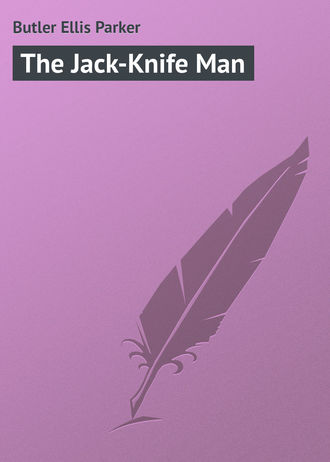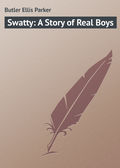
Butler Ellis Parker
The Jack-Knife Man
VIII. RIVALS
THUNDERING cats!” cried Peter with exasperation when the tramp had “ha, ha’d” and grinned through two more verses of the idiotic song; “I’ve got to go outside and tend to this boat!”
“You play with your toys a minute, now, Buddy,” said Booge, as soon as Peter was outside. “My voice is such a delicate voice I got to rest it between songs or it’s liable to get sick and die away for good. You wait ‘til I rest it and I’ll sing about that funny dog you’ve got there, if you remember to ask me.”
He took his few belongings from the valise and hung them before the fire and then, crawling into the bunk, settled himself comfortably, and went to sleep. When Peter came in a minute later, with feet and legs chilled, Booge was snoring.
“Get up, here!” said Peter, shaking him.
“You better not wake up Booge, Uncle Peter,” said Buddy, “he’s got to get his voice rested up.”
“You get up and get your boots on quick, and come out here and help me,” Peter commanded the tramp. “We got to get this boat afloat quick or we’ll be here all winter.”
“All right, Captain Kidd,” said Booge cheerfully. “And you remember to ask me to sing you that song about the funny dog,” he told Buddy.
The slough was now free from floating river ice, but Peter noticed that the wind was still from the east. This should have kept the ice running through the slough. He knew the ice must have jammed at the head of the slough, and that it might act as a dam, lowering the water in the slough enough to make it impossible to move the boat. He was working at the pike-pole, but with poor success, and when Booge came out their combined efforts seemed to accomplish no more. But Peter knew the boat must be moved, and long after Booge wanted to give it up as a bad job, Peter made him labor at the pole. By standing on the landward edge of the deck and joggling the boat as they pushed on the pole they succeeded in inching the shanty-boat toward deeper water, and at length she floated free and swung down the current. Where the lake narrowed and ended Peter ran the boat against the shore, letting her rest against a fallen tree. It was a precarious position, and one in which it would not be safe to leave the boat if the river ice ran again, but just above this where the lake widened, Peter saw a safe harbor. Fifty feet out from the southern shore of the lake a bar had formed, and between the bar and the shore there was deep water enough to float the boat. To break the ice of this cove, warp the boat around the point and into this snug harbor was Peter’s intention. His only cable had snapped close to the boat when she broke away, and he made Booge hold the bow of the boat close against the bank while he hastily twisted a makeshift rope of trot-lines – hooks and all.
With Booge on the shore dragging at the rope end, and Peter breaking the ice with his pike-pole from the deck, and pushing with the pole, the shanty-boat moved slowly out of the current of the slough and into the quiet water where, as the river fell, it would be stranded with its hull in the mud, as safe from danger as if on top of one of the hills two miles back from the slough.
It was hard work – the hardest Booge had tackled for years – and it consumed the balance of the day. When the two men went inside Peter did not complain when Booge threw himself on the bunk.
If Booge imagined he had won an easy and permanent victory, leading to a life of listless ease, he misestimated Buddy and Peter. Buddy alone could have kept him busy, but Peter let Booge know immediately that if he was to stay even a day he must earn his food and lodging.
The tramp was an odd combination of good nature and laziness; of good intentions and poor fulfilments. He could twang a banjo, when he had one to twang, and his present low estate was due to the untimely end of the career of a “medicine show,” one of those numerous half-vaudeville, half-peddling aggregations that at that time filled the country, charging a dime for admission to the “show” and a dollar a bottle for the “remedy.” Out of a hidden past Booge had dropped into the position of general “roustabout” for the show, caring for the tent, doing a banjo “turn” when the “artist” went on his regular spree, and driving the wagon when the show moved from town to town. When the final catastrophe came, Booge sold his banjo and started on the trail of another medicine-show. It fled as he advanced, and his garments decayed, were replaced with cast-off clothes, until he awoke one morning with a sharp realization that he was no longer a specialist seeking a position, but a common, every-day tramp. It did not annoy him at all. Being a tramp had advantages. He accepted it as his ultimate destiny.
Caught near Riverbank by the cold weather, he recalled Lone Tree Lake, where the duck hunters usually had a shack or a shanty-boat, vacant at this season, and he left the main road only to find nothing but the scant shelter of the duck blind. Peter’s boat, when it appeared, had seemed a gift from the gods.
The shore against which the boat now lay was a thicket of willows so close of growth that it was almost impossible to fight through them, and while most were no larger than whips some were as large as a man’s wrist. Against the low bank the boat lay broadside and so close that the willow branches reached over her roof, and as soon as Booge had brought his valise inside Peter reached far under the bunk and brought forth an ax.
“Now, Booge ain’t going to have time to sing songs to you daytimes, Buddy, because everybody that lives in this boat has work to do,” said Peter, “and as I’ve got to make some spoons, Booge is going to take this ax and clear away a path through the willows. And you want to cut them off close down to the roots,” he warned Booge, “or you’ll have to do it over again. You cut a path from the front door through that willow clump, so we can pass in and out and get fire-wood, and when you ‘ve got the path you can fetch the fire-wood. I’m going to stay in to-day and make spoons.”
Booge took the ax and looked at it quizzically.
“Well, if this ain’t my old friend wood-splitter I’ve been dodging for years and years,” he said good naturedly. “How-do, wood-splitter? How’s your cousin buck saw? Is all the little saw-bucks well?”
“You’d better get at them willows,” said Peter.
“I just wanted to enquire about them old friends of mine,” said Booge.
“You’ll have time enough to talk to Mr. Wood-ax before you get done with him,” said Peter dryly, and Booge laughed and went out.
That evening, when Buddy was in bed Peter put down his jack-knife long enough to scribble down the new variations of the “Tell the Little Baby” song.
“Writin’ a book?” Booge asked.
“Writing home to my folks to tell them how much I’m enjoying your visit,” Peter said, “and how sorry I am you ‘ve got to be moving along in a day or so.”
But Booge did not move along. After Peter had ostentatiously bathed once or twice Booge became painfully clean. He would come in from the jobs Peter set him and wash his face and hands violently.
“You ‘re getting as clean as them fellows that get five dollars’ worth of baths at the Y. M. C. A., ain’t you?” Peter said scornfully.
“A feller can get lots of things at the Y. M. C. A. for five dollars that he can’t get without it,” said Booge good naturedly. “You don’t want to knock me all the time, Peter. A horse crops grass one way, and a cow crops it another way, and the Lord is the maker of them all, as the feller said. So long as a man has a clean conscience and a clear eye he can walk right up to any bull alive – if the bull wants to let him.”
“I’m glad you got a clean conscience,” said Peter. “Maybe that’s why you don’t worry.”
“If you feed a pig regular it don’t ask to be petted,” said Booge, “and that’s the way with me, but you ought to give me some credit for the way I pitched in and labored in this here driftwood vineyard when you said to. I bet the prodigal son hated to get down to work after his pa’s party, and yet he got to be quite a respected feller in his neighborhood. You oughtn’t to think a man can’t work because he don’t. There’s lots of fellers never seen the sea that has eat salt codfish.”
“I guess you read that in a book,” said Peter.
“I guess not,” said Booge. “I never read but one book in my life. I read the Bible, unexpurgated edition, when I was a kid, and it sort of cured me of book readin’. There ain’t hardly a comfortable word in it for an easy-goin’ man. If the Bible had been published to-day it would have got some mighty severe criticism.”
“Booge,” said Peter suddenly, “how’d you ever happen to become a tramp?”
“How’d you ever happen to become a shanty-boatman?” asked Booge, grinning, but Peter was serious.
“I guess you ‘re right about that,” he said. “I hadn’t ought to object to what you are, when I’m what I am. I just let myself slide, was how. I had bad lungs was what was the matter with me, when I was a kid, so my pa bought me a farm and put a man on it to run it for me, and I just fooled around and tried to get husky and stout and by the time I was old enough to run the farm Father busted, and then a – certain circumstances took the farm from me, and I took to the river. It seemed like me and the river was old friends from ever so far back. So I stuck to it and it stuck to me, and – that’s the story.”
“Just run down hill,” commented Booge cheerfully. “It’s funny, ain’t it, that water’s about the only thing that don’t get blamed for runnin’ down hill? You and the river sort of run down together. What started me was something just about as common as lungs – it was wives. Yes sir, just plain wives!”
“Don’t mean to say you had two of ‘em?” asked Peter.
“Almost,” said Booge. “I had one-half of that many. I’m a naturally happy man, and I’ve had all sorts of ups and downs, and as near as I can make out, a man can be happy in most any circumstances except where he don’t give his wife the clothes she wants. My notion of hell is a place where a man has fifty wives and no money to buy clothes for ‘em. My wife got to goin’ through my pockets every night for money to buy clothes, so I skipped out.”
“You don’t mean to say a woman would rob a man’s pockets whilst he was asleep?” asked Peter. “Was that what she done? Took money from them?”
“No, the trouble was she didn’t find no money to take,” said Booge. “Light on money and strong on breath was what was my trouble.”
He made an expressive drinking motion with his hand.
“Booze,” he said. “Booze done it.”
“You’d ought to quit it,” Peter said. “You don’t seem like a common tramp. I wouldn’t let you stay here if you was. Look at the harm booze done you. Look at what it done when you went to sleep in that duck-blind.”
“That’s so,” agreed Booge. “It got me a good shanty-boat to sleep in and three square meals a day and a place to practise my voice in. But I suppose you mean it got me where I have to listen to temp’rance lectures from you.”
That was sort of hard on Peter, although he would not have admitted it, he was growing fond of the careless, happy-go-lucky tramp. Booge had a fund of rough philosophy and, more than all else, he was good to Buddy, and had not Peter resolved to be a different man himself on Buddy’s account, he would have liked nothing better than to have Booge make his winter home in the shanty-boat, but he felt that Booge must go. The trouble was to drive him away. Booge would not drive, and Peter thought of a hundred quite impossible schemes for getting rid of him before he hit on the one he finally decided to put into effect.
He had noticed that the farmer on the hill back of the lake, where Buddy had spent the day of his mother’s funeral, had a huge pile of cord wood in his yard, and he tramped across the lowland to the farmer’s house and dickered for the sawing of the wood. It was a large contract, and Peter as a rule did not care to saw wood except in dire straits, but he had decided that if he was to be a man of worth he must be a man of work to begin with, and the wood pile was opportunity. It was while walking home after making his bargain with his farmer friend that he had his happy idea – Booge must saw wood! His food supply would be cut off otherwise!
He explained it to Booge that evening. Here they were in the shanty-boat, Peter explained, the two of them and Buddy, all eating from the common store of food, and that store dwindling daily. Buddy could not work, but Peter could, and Booge must. Then he explained about the pile of wood, a good winter’s work for the two of them. Booge listened in silence. He was silent for several minutes after Peter ceased talking, and then he grinned.
“The man that says he wouldn’t rather find a silver dollar in the road than earn five dollars a-workin’, is like that man that got killed with a thunderbolt for careless conversation,” he said cheerfully, “so I won’t say it. Wood-sawin’ and me has been enemies ever since I became a tourist. I guess I’ll have to go – ”
“I bet you would!” said Peter.
“Yes,” said Booge, “I’ll have to go – up to that farmer’s and saw wood.”
His eyes twinkled as he saw Peter’s face fall. And he was as good as his word. The two men, taking turns carrying Buddy or leading him by the hand, walked across the snow-covered bottom to the farm the next morning, and while Booge did not over-exert himself, he at least sawed wood. He sawed enough to prevent any unduly harsh criticism from Peter.
For Buddy the trips were pleasure jaunts. He was able to play all day with the farmer’s little daughter, just enough older than he to hold her own against his imperious little will, and Booge might have developed into an excellent sawer of wood, but one morning, the little girl did not come out to play with Buddy. She was sick, and in due time Buddy became sick too – plain, simple measles.
“Now, then,” said Peter when one morning he awakened to find Buddy’s face covered with the red spots and the boy complaining, “one of us has got to stay here in the boat and take care of Buddy.”
“You’d better stay,” said Booge promptly. “You stay, Peter, and I’ll go on up and saw wood. I’m gettin’ quite fond of it.”
Peter hesitated. He ran his hand over the boy’s white head lovingly.
“Who do you want to stay with you, Buddy?” he asked.
“I don’t care, Uncle Peter,” said Buddy listlessly.
It was a full minute before Peter took his hand from Buddy’s curls.
“I guess you’d better stay, Booge,” he said then. “You can sing what he likes better’n I can.”
“Well, if you think I can amuse him better’n you can, I’ll stay, Peter,” said Booge reluctantly. “If he seems to hanker for you, I’ll fire the shot-gun and you can come to him.”
So one of these two men went to his work, and the other seated himself on the floor of the cabin with his back against the wall and sang “Go Tell the Little Baby, the Baby, the Baby,” through his nose, and made faces, to amuse a freckle-faced little boy with a very light attack of the measles.
IX. PETER GIVES WARNING
THE weather turned extremely cold. Peter came back from his wood-sawing one evening and found Buddy astride a rocking-horse. The table was on top of the bunk to make room for the horse, and Booge, robed in one of the blankets, was playing the part of a badly scared Indian after whom Buddy was riding in violent chase. For a week Buddy had been well, but Booge managed to make Peter think he could still see spots on the boy. Booge had no desire to begin sawing wood again. It was much pleasanter in the shanty-boat with Buddy.
The rocking-horse was the oddest looking horse that ever cantered. Among the driftwood Booge had found the remains of an old rocking-chair, and on the rockers he had mounted four willow legs, with the bark still on them, and on these a section of log for the body. With his ax he had cut out a rough semblance of a head and neck from a pine board. The tail and mane were seine twine. But Buddy thought it was a great horse.
“Looks like you was a great sculpist, don’t it?” said Peter jealously, as he stood watching Buddy riding recklessly over the prairies of the shanty-boat floor. “So that’s why you been trying to make me think freckles was measles. It’s a pity you didn’t have a saw to work with.”
Booge looked at Peter suspiciously.
“I guess maybe by to-morrow I can find one for you,” continued Peter. “I saw a right good one up at the farm. And quite a lot of cord wood to practise on.”
“If you ain’t just like a mind reader, Peter!” exclaimed Booge. “You must have knowed I been hankerin’ to get back there at that pleasant occupation. But I hated to ask you, you ‘re so dumb jealous of everything. It’s been so long since you’ve invited me to saw wood I was beginnin’ to think you wanted the whole job for yourself.”
“You won’t have to hanker to-morrow,” said Peter dryly.
“To-morrow? Now, ain’t that too bad!” said Booge. “To-morrow’s just the one day I can’t saw wood. I been hired for the day.”
“Uncle Booge is going to make me a wagon,” said Buddy.
“Uncle Booge is going to take you up to the farm while he saws wood,” declared Peter. “Uncle Peter will make you a wagon later on, Buddy.”
“I want Uncle Booge to make me a wagon to-morrow,” Buddy insisted. “He said he would make me a wagon to-morrow. With wheels.”
“And a seat into it,” added Booge.
“All right,” said Peter with irritation, “stay here and make a wagon, then,” but that night when Buddy was in the bunk and asleep, Peter had a word for Booge.
“I don’t want to hasten you any, Booge,” he said, trimming the handle of a wooden spoon with great care as he spoke, “but day after to-morrow you’ll have to pack your valise and get out of here. I don’t want to seem inhospitable or anything, but when a visitor gets permission to stay over night to dry his boots, and then camps down, and loafs, and stays half the winter, and makes wagons and horses there ain’t no room for in the boat, he’s done about all the staying he’s entitled to.”
“Buddy’s been askin’ to have me go again!” said Booge.
“No, he ain’t,” answered Peter. “He – ”
He caught the twinkle in Booge’s eye and stopped.
“Let’s wake Buddy up and ask him,” said Booge.
“Buddy ain’t got anything to say on this matter,” said Peter firmly. “And I ain’t sending you away because you are trying to play off from doing your share of wood sawing, neither. I’m Buddy’s uncle, and I’ve got to look out for how he’s raised, and I don’t want him raised by no tramp, and that’s how he’s being raised. Every day I think I’ll chase you out to saw wood, and every day you come it over me somehow, and I go, and you don’t. I don’t know how you do it, but you’re smart enough to make a fool of me. That’s why you got to go.”
“Is it?” asked Booge placidly. “I thought it was because you was jealous of me. Yep, that’s what I was just thinkin’. He’s jealous and he don’t care nothin’ for what Buddy likes, or wants, or – ”
“Nothing of the sort,” said Peter indignantly. “You ain’t no sort of example to set the boy. I heard you swear this morning when Buddy stuck a fork into you to wake you up. No man that uses words like you used is the sort of man I want Buddy to be with.”
Booge grinned. There was no use in rebutting such an accusation. Indeed, he felt he had no call to argue with Peter. Day after to-morrow was a distant future for a man who had lately lived from one meal to the next. Booge believed Buddy would be the final dictator in the matter, and he was sure of Buddy now.
“So I guess you’ll have to go,” continued Peter. “For a tramp you ain’t been so bad, but it crops out on you every once in awhile, and it’s liable to crop out strong any time. If it wasn’t for the boy I’d let you stay until the ice goes out. I’d got just about to the point where I wasn’t no better than a tramp myself, but when – but I’ve changed, and I’m going to change more.”
Booge nodded an assent.
“I can almost notice a change myself,” he said, “but the way you ‘re going to change ain’t a marker to the way I’m goin’ to change. I’ve been planning what I’d change into ever since I come here. I ain’t quite decided whether to be an angel cherub, like you – or a bank president. I sort of lean to being a bank president. Whiskers look better on a bank president than on an angel cherub, but if you think I’d better be an angel cherub, I’ll shave up – and make a stab at – ”
“You might as well be serious, my mind’s made up,” said Peter coldly. “You got to go.”
“Suppose,” said Booge slowly, “I was to withdraw out of this here uncle competition and leave it all to you? Suppose I let on I lost my singin’ voice?”
“No use!” said Peter firmly. “My mind’s settled on that question. The longer you stay the harder it’ll be to get you to go. I’m givin’ you ‘til day after to-morrow because I’ve got’ to go up to town to-morrow. We ‘re shy on food. If it wasn’t for that I’d start you off to-morrow.”
“Now, suppose I stop bein’ Uncle Booge. Say I start bein’ Gran’pa Booge, or Aunt Booge,” proposed Booge gravely. “I’ll get a gingham apron and a caliker dress – ”
“You’ll get nothin’ but out,” said Peter firmly. “You’ll be nothin’ but away from here.”
The trip to town had become absolutely necessary. Peter had drawn ten dollars from the farmer and he had some spoons ready for sale. The farmer was going to town and Peter had at first decided to take Buddy with him, but the spoon peddling excursion would, he feared, tire the boy too much, and he ended by planning to let Booge and Buddy stay in the shanty-boat.
It was an index to Peter’s changed opinion of the tramp that he felt reasonably safe in leaving Buddy in Booge’s care. For one thing Booge was sure to stay with the boat as long as food held out and work was not too pressing. The river had closed and the boat was solidly frozen in the slough. There was no possibility of Booge’s floating away in it.
“I won’t be back until late,” said Peter the next morning as he pinned his thin coat close about his neck, “and it’s possible I won’t get my spoons all sold out to-day. If I don’t I’ll stay all night with a friend up town and get back somewhere to-morrow. And you take good care of Buddy, for if anything happens to him I’ll hunt you up, no matter where you are, and make you wish it hadn’t.”
“Unless this horse runs away with him there ain’t nothin’ to happen,” said Booge. “You needn’t worry.”
“And, Buddy, if you are a good boy and let Booge put you to bed, if I don’t get back, Uncle Peter will bring you something you’ve been wanting this long while.”
“I know what you ‘re going to bring me,” said Buddy.
“I bet you do, you little rascal,” said Peter, thinking of the jack-knife. “We both of us know, don’t we? Good-by, Buddy-boy.”
He picked up the boy and kissed him.
“You don’t know what Uncle Peter is going to bring me, Uncle Booge!” said Buddy joyfully, when Peter was gone.
“No, sir!” said Booge.
“No, sir!” repeated Buddy. “Cause I know! Uncle Peter’s going to bring me back my mama.”







